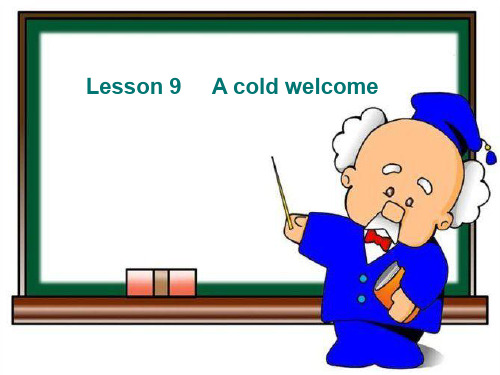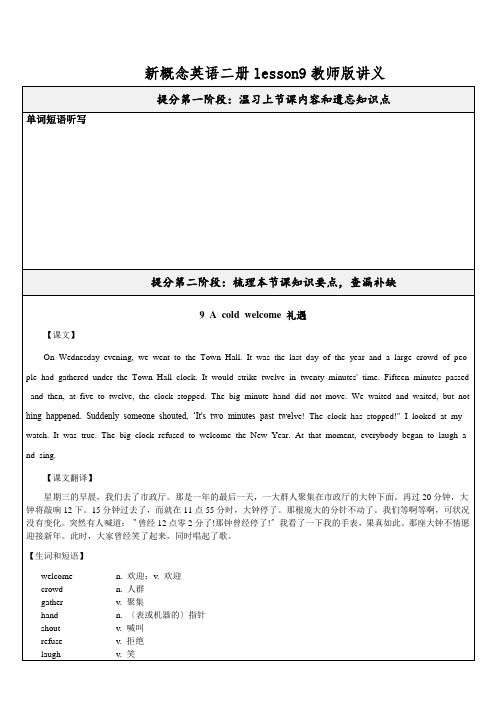新概念第二册讲义Lesson9
- 格式:doc
- 大小:39.00 KB
- 文档页数:4

新概念英语第二册第九课课后习题答案Lesson 91. b 根据课文内容 It was the last day of the year…和The big clockrefused to welcome the New Year, b 最符合课文内容,其他3个选择都不对。
2. b根据课文...at five to twelve, the clockstopped.钟是在午夜前停的,但人们是在午夜后才意识到这一点的。
(It's two minutes pasttwelve!),所以 b.是对的。
a. before midnight 和课文事实不符合。
钟是在午夜前停的,但人们是在午夜后才意识到这一点的。
3. d the evening 前需要有介词in才能构成表示时间的短语,所以选d.其他3个选择都不对。
4. a people 是集体名词,虽然形式是单数,但意思是复数的(人民或人们),做主语时候谓语动词要用复数形式。
B. was, c. is ,d be 都不能用在people 后面做谓语动词,只有a. were 可以,所以选a.5. a 这个问句的回答是一个表示时间的短语,因此需要一个针对时间提问的疑问词。
只有a. when是针对时间提问的,而其他3个都不是问时间的。
6. b在表示钟点的时间短语前面用介词at,所以只有b. at 是对的。
7. b从回答中可以看出,这个疑问句需要一个能够针对nothing提问的词,而且要能够在疑问句中充当主语。
a.nothing可以做主语,但一般不用在疑问句中;c. any 是量词,不能做主语;d. athing可以做主语,用在这个问句中意思虽然通顺,但不符合习惯用法;b. anything是不定代词,可以做主语,而且只能在疑问句中做主语,所以b.是对的。
8. d a. hit , b. beat, c. knock , d. strike这几个动词中都有“敲”,“打”,“击”的意思,但是只有strike 有“(钟表)敲鸣”,“报时”的含义,所以最佳选择是d.9. b 本句表示钟点的短"几点过几分"中只能用介词past,所以只有b. past 是正确的答案。





Lesson 9 A cold welcome 阅读理解1. W here did we go on New Year’s Eve?___________________________ on New Year’s Eve.2. A t what time did it stop?It stopped _________________.单词详解1. welcome n. 欢迎;v. 欢迎词组:welcome to sp. _______________2. crowd n. 人群词组:__________________ 一群……派生:crowded adj. ________3. gather v. 聚集4. hand n. (表或机器的)指针hand的其它用法:Could you give me a hand? ____________I saw you guys in the street hand in hand. ____________the hour hand of a watch 手表的____________5. shout v. 喊叫结构:__________________翻译:他对着我大叫“船沉了”。
He __________________ that the boat is sinking.He was greeted with shouts: “Long live the president.” 词性:_____6. refuse v. 拒绝结构:__________________翻译:我不想和你说话。
____________________________________7. laugh v. 笑翻译:We all laughed at Jim, for he said he believed in ghosts. _____ 谚语翻译:He who laughs last laughs longest.____________________________________派生:_____________ n. 笑课文解析1. On Wednesday evening, we went to the Town Hall. 【思考1】还有哪些词组可以表示“帮忙”的意思呢?【思考2】还有哪些词可以表示“喊叫”【复习】翻译:玛丽是一个有趣的女孩。
Lesson 9【New words and expressions】生词和短语★welcome n. 欢迎;v. 欢迎 a cold welcome 冷遇welcome to+地点 welcome to China, welcome to my home/welcome Home/back You are welcome./welcome adj.You are welcome to+地点★crowd n. 人群crowd :in the crowd I spotted him in the crowd 一眼看见a crowd of people 没有次序的人群,拥挤的人群 a group of people 有次序的人群 a large crowd of people 一大群人/crowds of people 许多人,人山人海crowd v.拥挤,挤满★gather v. 聚集 people gathered 人们聚集在一起,尤指自发性的聚集★hand n. (表或机器的)指针minute hand/second hand/hour handsecond hand 二手的,旧的wait me a moment/wait me a few seconds(for a few secs.) secs.:seconds的缩写★shout v. 喊叫 call out 大声喊叫 cry out 大声哭喊 scream 尖叫A cold welcome 冷遇 cold 冷的,寒冷的,冷淡的cold fish 冷漠的人 My brother is a cold fish.lucky dog幸运的人refer to 指……On Wednesday evening in the eveningstrike v.strike the clock敲钟/clock strike钟自己响Listen, the clock is striking. strike twelve 数字表示敲击的次数in twenty minutes' time 20分钟之后 in 表示在段时间以后We will finish class in half an hour.minutes'名词所有格 It will leave in...minutes'timean hour's time名词以-s结尾或者本身是以-s结尾的复数名词,所有格加’名词所有格表示时间或距离How far is the school from here? _3 minutes' walk.pass 过了 to 没到25 minutes passed eight a quarter to nine/15 minutes to nine时刻指点时间,时间指段时间时刻前的介词用at I go to school at seven o'clock.顺序句式... An hour passed and then,he arrived.some time passed and then,sth happened.The clock has stopped!现在完成时,强调过去动作导致的结果。
I have had my breakfast.我已经吃过早餐了It was true...这是一个事实 It was true that+从句refuse to do sth.拒绝去做某事 I refuse to leave.我拒绝离开at that moment :just then就在那时at the moment: now 现在,此刻,在此时Key structures】When did you arrive?I arrived at ten o'clock.at/in/on/otherswhen...?in the morning;in the afternoon;in the eveningon Friday;on 15th; on Wednesday evening; on fine afternoon 有修饰词用on in a week;in January;in Feb.in summer;in spring; in autumn;in winterin 1992;in 1999at night; at noon; at five to twelve; at ten o'clockuntil 直到……时候I can't enter for the sports meeting until tomorrow.from..to... Everyday we have English class from 8:30 to 11:30during 在……期间in the holiday:强调这段时间其中某一点时间,并不表示自始至终during the holiday 强调假期的从头到尾He enjoyed himself during his holiday. I was caught in an accident in the holiday Exercises B1.in;2.on;3.in没有强调自始自终4.in5.at(at the moment=now)6.on;in7.in;8.at;in9.until【Special Difficulties】not...any and no...any 用于否定句和疑问句中,some用于肯定句Do you have any friends?I don't have any friends.not 用在非实义动词后面,实义动词前面.not any=no adj.用在名词前面I have no friends.Exercise BHe hasn't any hobbies. ---->He has no hobbies.He does not go anywhere.--->He goes nowhereHe does not see anybody.--->He sees nobody.He is not interested in anything--except food!---->He is interested in nothing --execpt food【Mulitiple choice questions】4.A people:人们,做主语是一定是复数 police,cattle是复数8.D 敲门用knock敲钟用strike hit轻和strike重(hit hard)在一定的时候可以互换打一下 beat 连续不断的打beat drums12. deny:否认拒绝去承认,后面一般加名词 refuse:拒绝A young businessman had just started his business, and rented a beautiful office. Sitting there, he saw a man come into the outer office. Wishing to appear busy, the businessman picked up the phone and pretended that he had a big deal working. He threw huge figures around and made giant commitments.Finally, he hung up and asked the visitor. "Can I help you?" The man said, "Sure. I've come to install the phone."Be a Tutor 作家庭教师E: Hello.C: Emma, this is Caroline.E: What's up?C: I have a friend. She is my best friend and she wants to learn English. She would pay about 100 yuan per hour. Are you interested?E: I don't know.C: So I take it you are not interested.E: No, Caroline. Don't get me wrong. I mean school will be open on Sept. 2nd, and I will have a very tight schedule by then.C: Don't worry. My friend says she can always arrange her schedule around your schedule.E: That will be fine. When can I see him?C: Let's do it this way. I'll take her to your place this Saturday. Then you two can make a schedule.E: Make sure you come here before noon. I will be picking up my friend at the airport in the afternoon.C: How are you going to get there?E: By bus, of course.C: I am sure my friend can give you a ride.E: Great. By the way, what does your friend do?C: She is a lawyer.E: Ok, see you then.C: See you.。